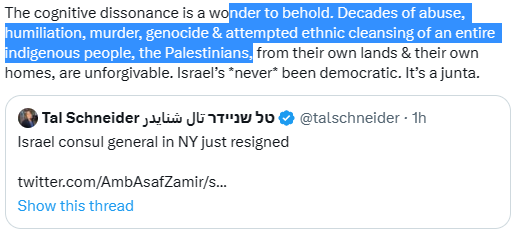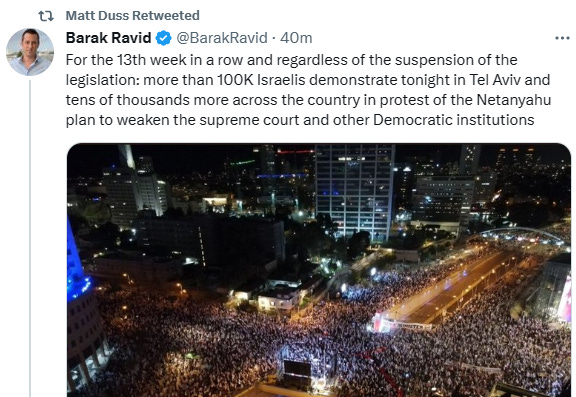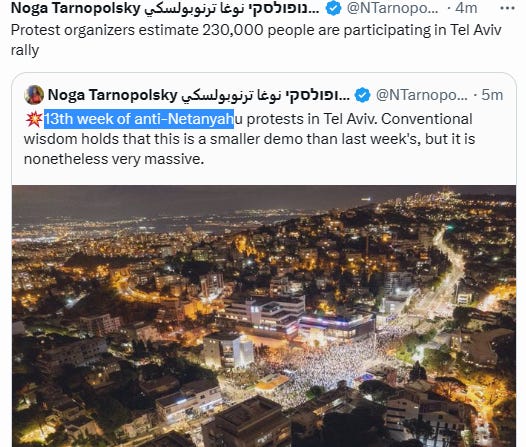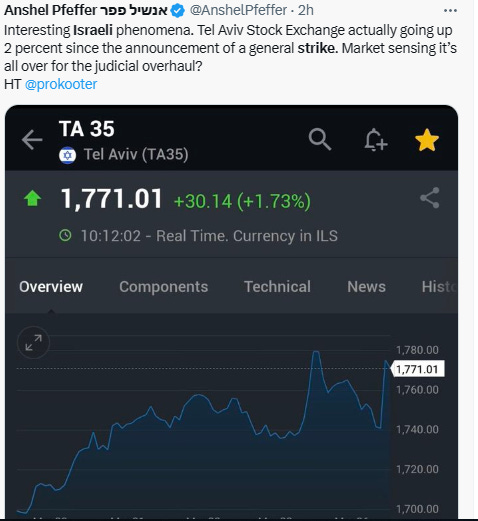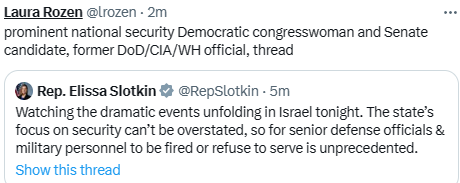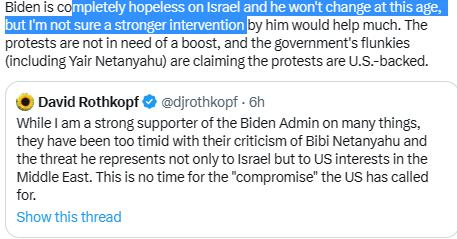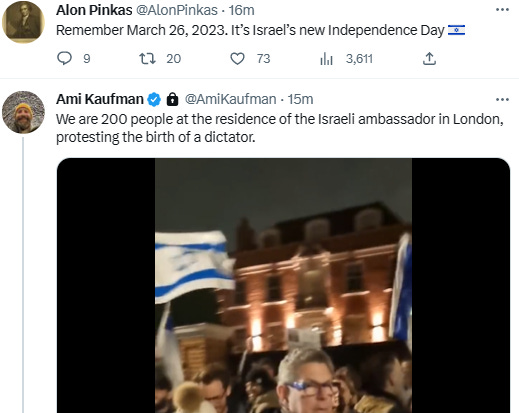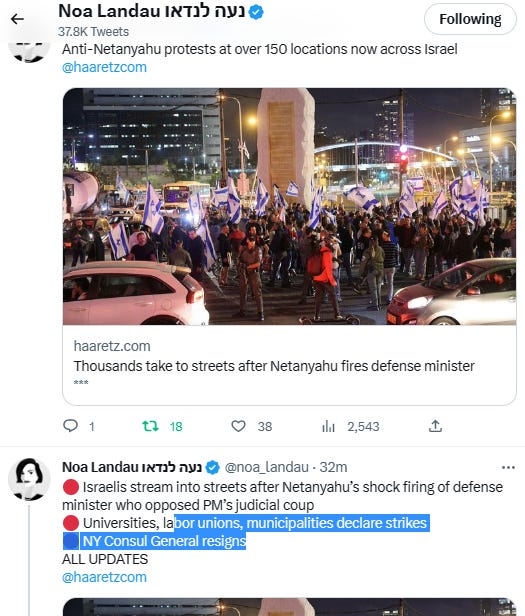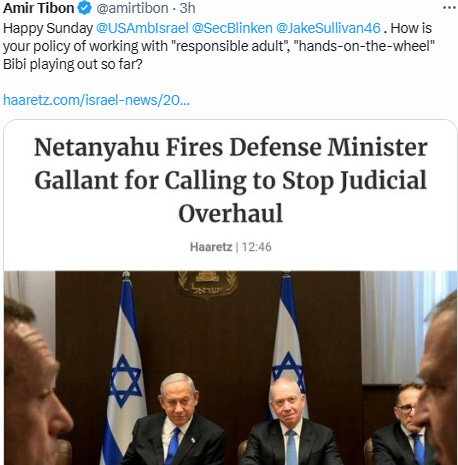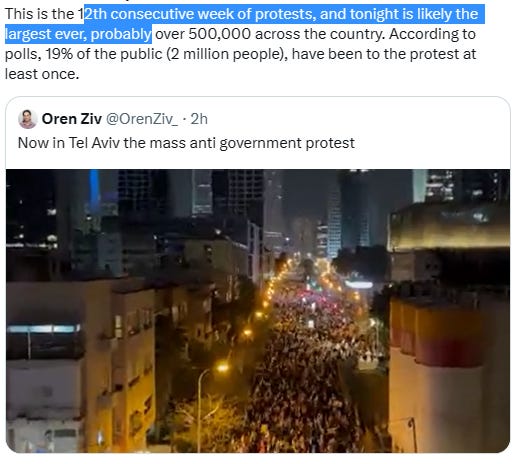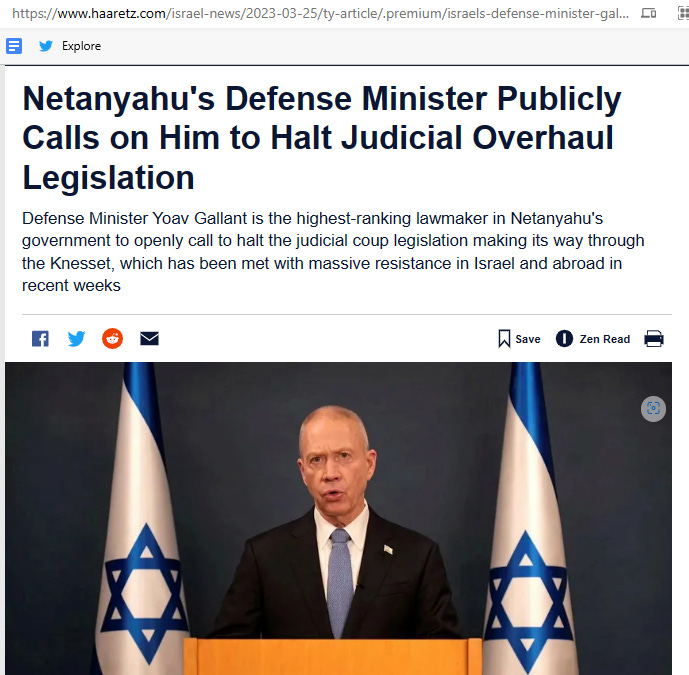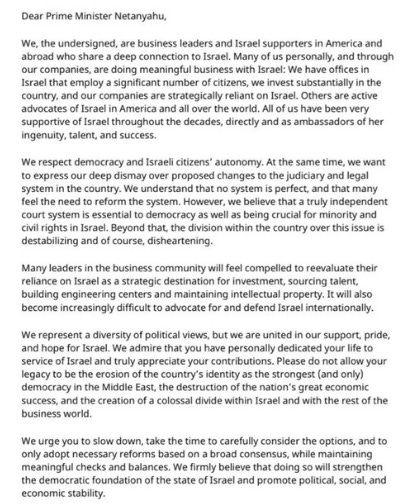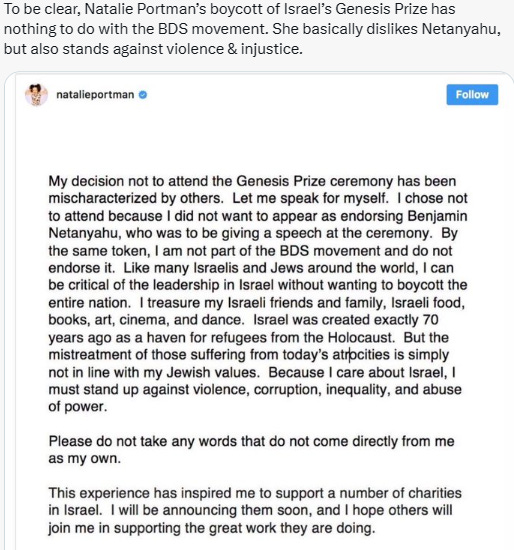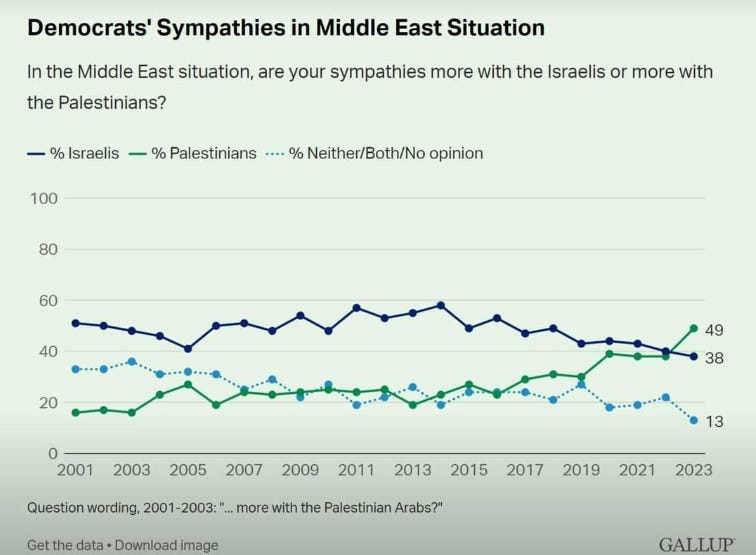Natalie Portman Warns You Long Time Ago About (Brutality) Netanyahu But You Never Heard Carefully.
Not Only Defense Minister Tonight Say No To Netanyahu, (but) Natalie Portman Was. Years Ago
I am typing again some news 5 years ago: “Like many Israelis and Jews around the world, I can be critical of the leadership Netanyahu in Israel (Natalie Hershlag, popular with Natalie Portman). 11 minutes ago (before I write this), Netanyahu's Defense Minister, Yoav Gallant, publicly calls on him to halt judicial overhaul legislation. He say no to Netanyahu.
Matt Duss: former adviser of foreign policy for Bernie Sanders. Sanders may run (again) for 2024 U.S. Presidential Election. Of course, Sanders is Jewish
(Tel Aviv still open at least until 3 pm, then, join General Strike)
(March 27th, 2023 in Tel Aviv, around 00.20 am // March 27th, 2023, around 4.20 am in Jakarta)
This midnight in Tel Aviv means already 4 weeks consecutive massive protest (daily 200k - 600k protesters) from Israeli itself about overhaul legislation, Netanyahu’s desire. 200k - 600k Israelis are protesting because they believe Israel’s settler-fascist government is literally destroying the country, yet Zionist trolls on this hellsite still reproduce the propaganda that BDS, a social justice movement calling for equal rights for all is the real threat.
Natalie Portman echoed again to look again what Netanyahu wrong since decades ago. Her statement of grievance with Netanyahu’s government seemed to be at least in part about refugee policy, since years ago. Years ago, there are currently about 40,000 undocumented migrants (now estimated 110k), mostly African asylum seekers, in Israel. Netanyahu’s government since years ago, and repeat again for his tenure this year, backed off initial plans to deport them. Portman’s statement seemed to imply that this was the “recent event” that had so upset her.
“Israel was created exactly 70 years ago as a haven for refugees from the Holocaust,” she writes. “But the mistreatment of those suffering from today’s atrocities is simply not in line with my Jewish values.”
However, focusing on the past month or so of Israeli political developments somewhat misses the point. Portman has long been a critic of Netanyahu’s government; after his 2015 reelection, she told the Hollywood Reporter that she was “very, very upset and disappointed,” blasting him for “racist” comments about Arab voters during the campaign.
Indeed, her statement contained a largely overlooked line — “because I care about Israel, I must stand up against violence, corruption, inequality, and abuse of power” — suggesting that this is about more than just current events, but rather broader concerns Portman has with the Netanyahu government. This is less about a boycott of the Israeli state writ large, and more an American Jew and Israeli citizen expressing her concern with the state’s current leadership.
The fact that Portman is framing her criticism as coming from a place of affection for the Jewish state, not hostility, makes it more likely that other Jews — especially Americans — will take it seriously.
“This is an important symbolic moment,” says Jeremy Pressman, a scholar of the Israeli-Palestinian conflict at the University of Connecticut. “She cannot just be written off as a BDS supporter.” To separate the actions of settlers in the West Bank from the rest is an attempt to conceal the reality of Israeli settler colonialism that exists from the Jordan River to the Mediterranean Sea.
255 US Jewish business leaders, with billions of dollars in Israel, warn Netanyahu they will halt Israel investments if he pursues his régime change plan. Among them: Gene Ludwig, Jeff Feig, Tom Glocer, former Treasury Undersecretary Jeffrey Goldstein. Palestinian calls for Boycotts, Divestment and Sanctions are met with lawfare and false charges of antisemitism. Now US Jewish leaders are calling for boycott and divestment. It seems BDS is a problem only when colonised, subjugated peoples use it in their quest for justice.
March 22nd, Ambassador Michael Herzog summoned to meeting with Deputy Secretary of State Wendy Sherman following approval of the law repealing Disengagement in northern Samaria.
Many prominent Israelis are calling for a boycott of Netanyahu’s far-right gov to deter its attack on Israel’s ethnic democracy. Are they “engaging in antisemitism & BDS” or is this the case only when the boycotter thinks Palestinians are humans with basic rights? Israelis complain about the cost of living, all while taking vacations abroad, buying cars and dining out at restaurants.
This is why Netanyahu keeps getting elected--and why a boycott campaign, such as the BDS, will not amount more than just a drop in the bucket. And, a peace process? Why if you can have your cake and eat it too. In the case of Israel, often celebrated as a ‘start-up nation’, the development and monetization of military technologies is deeply tied to violence it enacts upon a captive, subjugated native population, the Palestinians. For example, about holocaust complicated, supporting Israel redeems Germany of genocide guilt while legitimating its fascist + supremacist tendencies. That Germany doesn’t feel any responsibility at all towards Palestinians reflects how present colonial, racist + extermination logics are within German polity + society.
If this were just one person taking a one-time stand, it wouldn’t be all that noteworthy. But Portman’s stand against the Netanyahu government points to much broader and deeper divides emerging between Israel and American Jews.
On one level, the divide between Israeli and American Jews couldn’t be simpler: Israeli Jews are, on the whole, more conservative than their American peers. Forty-nine percent of American Jews identify as liberal, per Pew data; only 8 percent of Israeli Jews say the same. Nearly twice as many Israeli Jews (37 percent) as American Jews (19 percent) described themselves as politically conservative in Pew’s survey.
This owes to profoundly different historical experiences. American Jewish identity comes from “a sense of exclusion from American society,” Steven M. Cohen, a research professor at Hebrew Union College-Jewish Institute of Religion, told me. Israel has a long and robust socialist political tradition but has tilted sharply rightward after the 1990s peace process collapsed into the violence of the Second Intifada and a 2005 military withdrawal from the Gaza Strip ended up with a takeover of the territory by the Islamist group Hamas.
In every presidential election in recent memory, a majority of American Jews have voted for the Democratic candidate. Israel’s center-left Labour Party has not won an election since 1999.
The result is a slow but steady sense of alienation of American Jews from the Israeli political system. A growing number of American Jews look at Israel and see a country that is occupying Palestinian territory and breaking up peaceful Palestinian protests using force and a Jewish state that only recognizes one socially conservative strand of Jewry, Orthodox Judaism, as legitimate — which manifests in things like preventing liberal American Jews from praying in mixed gender groups at the Western Wall, the holiest prayer site in Judaism.
The Pew data shows a clear age gap here: Younger American Jews are, overwhelmingly, more skeptical about Israel’s political direction than their older peers. Five times as many American Jews between the ages of 18 and 29 think the United States is “too supportive” of Israel as those over the age of 65. Only a third of Jews between the ages of 18 and 49 believe Israel’s government is making a sincere attempt at peace with the Palestinians; the number is 10 points higher among Jews ages 50 and up.
Natalie Portman, age 42, is one of the most prominent members of the younger cohort of American Jews —- alongside (younger) like Emily Wilder, former AP journo. Portman decision to cancel the speech serves not only as an example of tensions between liberal America and conservative Israel boiling over, but actually stokes the conflict: She is serving as a role model, a Jew and Zionist in good standing who’s willing to take a vocal stand against the Israeli government.
Views of the Israeli-Palestinian conflict have shifted sharply among Democrats, who said they sympathized more with Palestinians than Israelis for the first time in an annual Gallup survey.
Overall, most U.S. adults sympathize more with Israelis (54%) than Palestinians (31%), and two-thirds of Americans continue to view Israel favorably. However, views on the Middle East conflict are becoming increasingly polarized in the U.S. by party and by generation.
In 2016, 53% of Democrats said they sympathized more with the Israelis, and 23% with the Palestinians.
By 2022, that gap had virtually disappeared. When Gallup conducted this year's poll from Feb. 1-23, just 38% of Democrats chose the Israelis while 49% said they sympathized more with Palestinians. That shift has been driven largely by Americans born after 1980, a narrow plurality of whom are more sympathetic to Palestinians than Israelis. Americans from older generations are more than twice as likely to sympathize with the Israelis. The progressive wing of the Democratic caucus in Congress has also grown increasingly vocal about the Palestinian cause.
Between the lines: Some Israeli officials and analysts have argued that Prime Minister Benjamin Netanyahu made Israel a partisan issue in Washington by aligning so closely with the Republicans.
This is why prominent Israeli politicians — who are, notably, right-wing — have called for her citizenship to be stripped, or tried to marginalize her as somehow anti-Semitic. They worry, not without cause, that she’s a harbinger of future conflict between Israel and its most important international ally.
Now, there have always been tensions between Israel and diaspora Jewry. Every community has internal issues. But the ideological divide, particularly with respect to the Palestinians and the synagogue-state divide, has never been sharper. Brent Sasley, a political scientist at the University of Texas Arlington, tells me this an example of “the harmful global effects of the rise of the neo-nationalist/religious right in Israel” on Israel’s relationship with the diaspora — and it’s hard to argue with him.
So long as Israel continues its rightward drift, incidents like this will almost certainly become more and more common.






